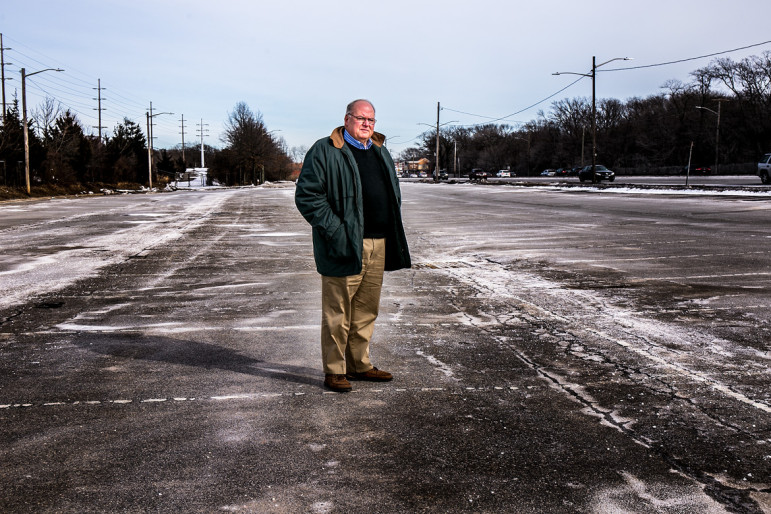
Adi Talwar
Until he gets a Certificate of Relief and applies for a new funeral director's license, John Orlando remains barred from the work of dressing bodies, saying prayers and arranging flowers.
When John Orlando was released from prison last year, he wanted to get his life back. He’d worked for decades as a funeral director, and he wanted to keep doing that. He loved the work, he needed the money, and he wanted the dignity of paying back the money he stole.
“I was guilty. I did it. I deserved to be punished,” Orlando said this past fall over breakfast in a Long Island diner. “If I could get my license back, I could make good.”
But he can’t. Orlando stole hundreds of thousands of dollars from his sick cousin who entrusted him with his estate. And when Orlando’s business failed, he couldn’t pay back the people who’d prepaid for their funerals.
He was convicted of three felonies for those crimes, and so he can’t yet get that license back. In 2016, three years after his release, he’ll be eligible to apply for a Certificate of Good Conduct, and if he gets it he’ll be allowed to at least apply to get a new funeral directing license. Until then, Orlando remains barred from the work of dressing bodies, saying prayers and arranging flowers.
There are two similar kinds of certificates under New York state law: Certificates of Relief and Certificates of Good Conduct. They’re almost identical legally. The difference, put simply, is that people convicted of multiple serious crimes can only get a Certificate of Good Conduct, and they have to wait before they’re eligible to apply – the way John Orlando is waiting now. There’s no built-in wait time for Certificates of Relief, which are reserved for people whose crimes were less serious.
They’re peculiar documents. They were created to rehabilitate people with criminal histories by striking at the discrimination – legal, illegal and extralegal – that they face. But oftentimes a person with a conviction can only get a certificate after showing they’ve regained a place in society.
That creates a catch-22. A conviction can bar someone from public housing. It can keep them from getting professional licenses—such as the ones required to direct funerals, or be a security guard or a home health aide, among many others. And employers stigmatize people with convictions, making it hard for them to get jobs.
These are the problems certificates were created to remedy, but also the problems people often have to surmount before they’re deemed worthy of one.
“On the one hand the certificates are a means to rehabilitation,” says Molly Kovel, a lawyer with Bronx Defenders. “On the other, DCCS [the Department of Corrections and Community Supervision], judges, they see them . . . as a gold star, as a thing you get after you’ve been rehabilitated.”
And so people with convictions are sometimes left to twist in the wind. Even if they have a certificate, people with criminal records tend to be poor and less educated—things that make it difficult to get things like an apartment or a job. Without a certificate, advocates say, it’s even worse.
“It’s not serving time that’s hard. Living after you’ve done time is hard,” says Richard Langone, a lawyer with personal experience with these issues: he was convicted of second-degree murder when he was a teenager. “Not many lawyers think beyond the consequences of a sentence.”
Offer limited relief
New York state originally created a single certificate back in the 1940s, and expanded it in fits and starts over the following decades. In 1976, when Governor Hugh Carey signed off on a law creating the two-certificate system still in place today, he framed them as a way to stem the “senseless discrimination” against people with convictions.
“Providing a former offender a fair opportunity for a job is a matter of basic human fairness, as well as one of the surest ways to reduce crime,” the then-governor wrote.
A conviction stays on a person’s record even if they get a certificate, and they still have to disclose their convictions on things like job applications. And even if someone has a certificate for a conviction, people are still allowed to not hire them—or issue them a license, or rent them an apartment, among other things—on the basis of that same conviction. Certificates, legally, do no more than “weigh in the applicant’s favor” of the idea that its holder is rehabilitated. And in the cases in which a conviction would automatically disqualify somebody from getting something like a license or a lease, they’re at least allowed to apply.
A certificate can help a private job applicant show an employer that they’ve changed, and make it more likely that they’ll get the job, says Joanne Page, president and CEO of the Fortune Society, which helps people reintegrate after they’ve been incarcerated. But a person can only make that argument if they get the interview. And though it’s illegal in New York State to toss out someone’s application solely on the basis of their criminal history, advocates say that private employers often do.
“The biggest issue is the blanket discrimination we see, where the person doesn’t even get a chance to be looked at, let alone present a certificate,” Page says. “If we can get them in the door, and present themselves on merit, 90 percent of the problem is over.”
Newly needed
Both certificates are ordinary-looking pieces of paper. They list the crime the person committed, and at the top it says “For Court or Board of Parole.” Depending on the person’s criminal history, they’ll either apply to the Department of Corrections and Community Supervision for a certificate, or else to the judge who sentenced them. Judges can sometimes issue someone a Certificate at the same time that they’re sentencing them—before they’ve been punished—to preempt the barriers they would face to rehabilitating themselves.
Certificates used to be a lot less necessary. It used to be rare for employers to ask after a person’s criminal history. And if they did, a person might have gotten away with lying. Checking up on people was tedious and expensive and fewer employers bothered. But people became much more anxious about security after September 11th. Coupled with the rise of the Internet, that anxiety fueled an explosion of background checks. And with that grew the need for certificates, as more people needed evidence that they had changed.
But few people get them. Since 2006, there have been over 200,000 releases from New York State prisons. The Department of Corrections and Community Supervision has issued 6,050 Certificates over that time, while rejecting 3,933 applications – a 60 percent approval rate. They are less rare than they used to be: the Department of Corrections and Community Supervision issued almost twice as many Certificates last year as it did eight years ago. But that still amounted to barely 1,000 of them.
That’s partly because few people know about them. If you google “Certificate of Good Conduct New York,” one of the first results is a city government website that links to the NYPD’s website for details on getting a Certificate of Conduct, a completely unrelated document.
Roland Acevedo, a lawyer who’s sued employers for discriminating against people with criminal histories, says lawyers are often as unaware about certificates as the people they represent. He adds that some judges, despairing of a defense lawyer’s ignorance, will suggest to the lawyer that they apply for a certificate for their client—that is, apply to the very judge suggesting that they apply.
“A lot of lawyers don’t know so they don’t ask,” Acevedo says. “It’s amazing how many people don’t know this law.”
A difficult application
But for those that do, Certificates can be powerful. After getting convicted of tax evasion back in 2010, the Ciprianis were in danger of losing the liquor licenses that made their restaurants possible. But the family, “whose lawyers are undeniably more talented than their cooks,” as the New York Observer put it, got a Certificate of Relief at their sentencing, which ultimately allowed them keep the licenses. But lawyers say that rarely happens for the average person.
For ordinary people, applying for a certificate from the Department of Corrections, in particular, is “overwhelming,” says Sebastian Solomon, a policy associate at the Legal Action Center. Among other things, applicants have to track down everywhere they’ve lived and worked over the past five years, their marital history and obscure details of their criminal history—including some the Department can likely access itself, like the prisons someone’s been in.
“It’s a seven-page form which is full of things, I would argue, that don’t make sense,” Solomon says. “It’s a really slow and unfriendly process.”
Certificates have languished in obscurity. It was only in 2010 that the state legislature fixed what amounted to a typo that had plagued certificate-holders for years. The two kinds of certificates established in the ‘70s have long been meant to run parallel, but over time they diverged slightly as certain laws happened to mention one or the other certificate and not both.
Still, some advocates worry that if more people got certificates as a matter of course, it could end up undermining the idea that they show that someone is rehabilitated. Certificates, the thinking goes, are only meaningful because virtually no one has one, argues Jason Hoge, who has worked as a public defender in upstate New York.
“Now everybody is ‘rehabilitated,'” Hoge says, imagining a scenario in which Certificates were widespread. “And then what’s the point of convicting people?”
The laws surrounding certificates aren’t likely to change anytime soon, advocates said. New York politicians have tried to tinker with the system in recent years, but little has changed. Right now the law reads that someone should not be given a Certificate unless it would help rehabilitate them and serve the public interest. Queens Assemblyman Jeffrion Aubry has repeatedly proposed changing that language to say that Certificates shall be issued to someone when it would help rehabilitate them and serve the public interest. It’s the boldest bill on record over the past couple years.
But small shifts in language could have an outsize effect. The certificate system needs a shift in attitudes and awareness, says Margaret Love, a lawyer specializing in the restoration of rights, and sentencing and corrections policy – and not a legislative overhaul.
“It ought to function better than it does,” she says. “It’s good on paper.”
Is consensus growing to change
the system of “collateral consequences” for
convictions in New York State?
Read more.
*********










4 thoughts on “NY’s Certificates Offer Catch-22 to People Convicted of Crimes”
When New York made prisons as an employment program they made a need for prisoners. This is just another way of keeping people that made a mistake down. Many times the only way to survive is to reoffend !
A need for prisoners? So I guess everyone up in Attica was just pulled in off the streets without being convicted by a jury. Committing a felony is not ‘making a mistake’.
Is it worth trying
Yes !